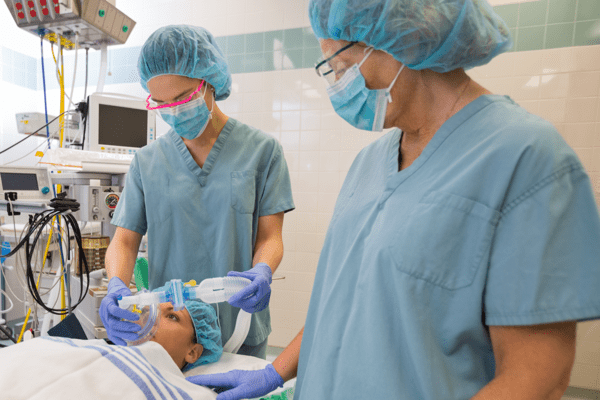

Nurse anesthetists prepare patients for surgery by administering drugs that reduce anxiety, induce unconsciousness, and control pain. They also monitor the patient’s vital signs throughout the procedure, evaluate the patient’s postoperative status, control pain during recovery, and develop anesthesia care plans for high-risk or critically ill patients. Notably, nurse anesthetists follow the same ethical guidelines as doctors and other medical professionals to uphold a professional standard of care.
Education Requirements to Become a CRNA
A nurse anesthetist is an advanced practice registered nurse with specialized training in anesthesia, who is qualified to both administer and manage the effects of drugs used during surgical and obstetric anesthesia.To become a nurse anesthetist, you must be licensed to practice as a registered nurse (RN) and hold a Master of Science in Nurse Anesthesia (MSN), Doctor of Nursing Practice (DNP), or Doctor of Nurse Anesthesia Practice (DNAP) from an accredited nursing program. CRNA programs at the masters and doctorate level are accredited by the Council on Accreditation of Nurse Anesthesia Educational Programs (COA).
Nurses who complete the degree requirements to become nurse anesthetists are eligible to sit for the National Certification Exam (NCE) and apply for CRNA licensure with the relevant state licensing authority in their state of practice.
Nurse Anesthetist Certification
The National Board of Certification and Recertification for Nurse Anesthetists (NBCRNA) is the certifying body that administers the national certification exam (NCE) for the initial certification of entry-level nurse anesthesia practitioners. The certification exam seeks to validate the knowledge needed to meet the rigorous standards for safe practice. Between January 1, 2020, and December 31, 2020, there were 3,130 NCEs administered, including 2,630 first-time test takers with an 85.2% first-time pass rate.
CRNA License Requirements
To practice as a Certified Registered Nurse Anesthetist you must hold a current unencumbered RN or APRN license in the state where you plan to work. Individual states may have additional requirements, so it is important to research the state in which you want to practice. For example, it is important to know the minimum number of clinical hours you must earn before you are eligible for entry into practice.
Nurse Anesthetist Degree Options
The education and training required to become a nurse anesthetist are rigorous and extensive. In some ways, the preparation to practice as a CRNA is similar to that which is necessary for a physician anesthesiologist. From beginning to end, students must successfully complete approximately 7-8 years of coursework and an average of 9,400 clinical hours, between earning a bachelor’s degree in nursing and attaining a master’s or doctoral degree in nurse anesthesia. An overview of the two degree pathways to become a CRNA is provided below.
Master of Science in Nurse Anesthesia (MSNA)
A Master of Science in Nursing – Nurse Anesthesia Program (MSN-NAP) is available in the United States specifically for nurse anesthesia students. The program is designed to help registered nurses make the transition from nursing to anesthesia practice in a period of 24 to 36 months of full-time study.
Academic courses cover anatomy and physiology, pharmacology, pathophysiology, medical ethics, pediatrics and obstetrics, intensive care/cardiac anesthesia, intraoperative monitoring, and analgesia. Graduates receive a Master of Science in Nursing (MSN) degree and are prepared to sit for the National Certification Examination and certification as a Certified Registered Nurse Anesthetist (CRNA).
Doctor of Nursing Practice in Anesthesia (DNAP)
The Doctor of Nurse Anesthesia Practice (DNAP) is a three-year, practice-oriented, academic and clinical graduate program, often referred to as a clinical doctorate. A clinical doctorate prepares nurses with a baccalaureate degree with the required competencies to be eligible for licensure and enter clinical practice in advanced practice roles.
Much like MSN programs, students enrolled in DNAP programs acquire the clinical education and supervised practice experience necessary to be eligible for licensure. Advanced academic courses and intensive clinical residency components are specifically designed to give students the knowledge and skills required to practice in the nurse anesthesia environment. While there might not seem to be a big difference between the programs, a DNAP program has an additional focus on leadership theory, education, and administration related to nurse anesthesia.
CRNAs Will Need a Doctorate Degree by 2025
For years, the minimum education requirement for CRNA certification was the completion of a Master’s of Science in Nursing. However, the trend toward more education for advanced practice nurses is changing the landscape for CRNA entry requirements.
Based on the recommendations of the American Association of Colleges of Nursing (AACN) which advised member colleges to transition all advanced practice nursing education to the DNP degree, the Council on Accreditation of Nurse Anesthesia Educational Programs (COA) has updated its policy on certification requirements. By the year 2025. all schools are required to only graduate CRNAs who have been educated at the clinical doctorate level.
Resources for CRNAs
- American Association of Critical Care Nurses (AACN)
- American Association of Nurse Anesthetists (AANA)
- American Board of Anesthesiology (ABA)
- American Society of Anesthesiologists (ASA)
- American Society of Regional Anesthesia (ASRA)
- American Society of Perianesthesia Nurses (ASPAN)
- Society for Ambulatory Anesthesia (SAMBA)
- Society for Obstetrical Anesthesia and Perinatology (SOAP)
- Society for Pediatric Anesthesia (SPA)






